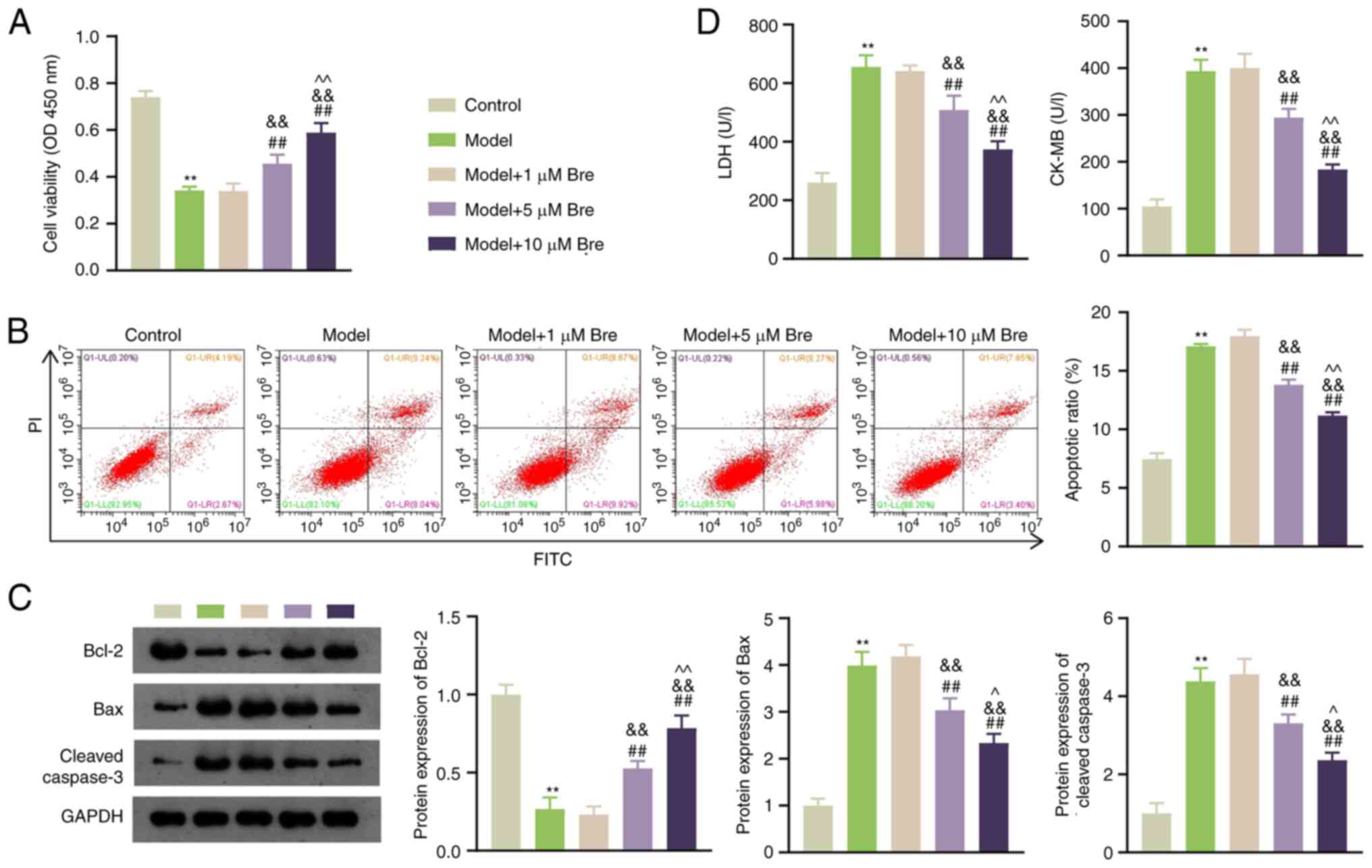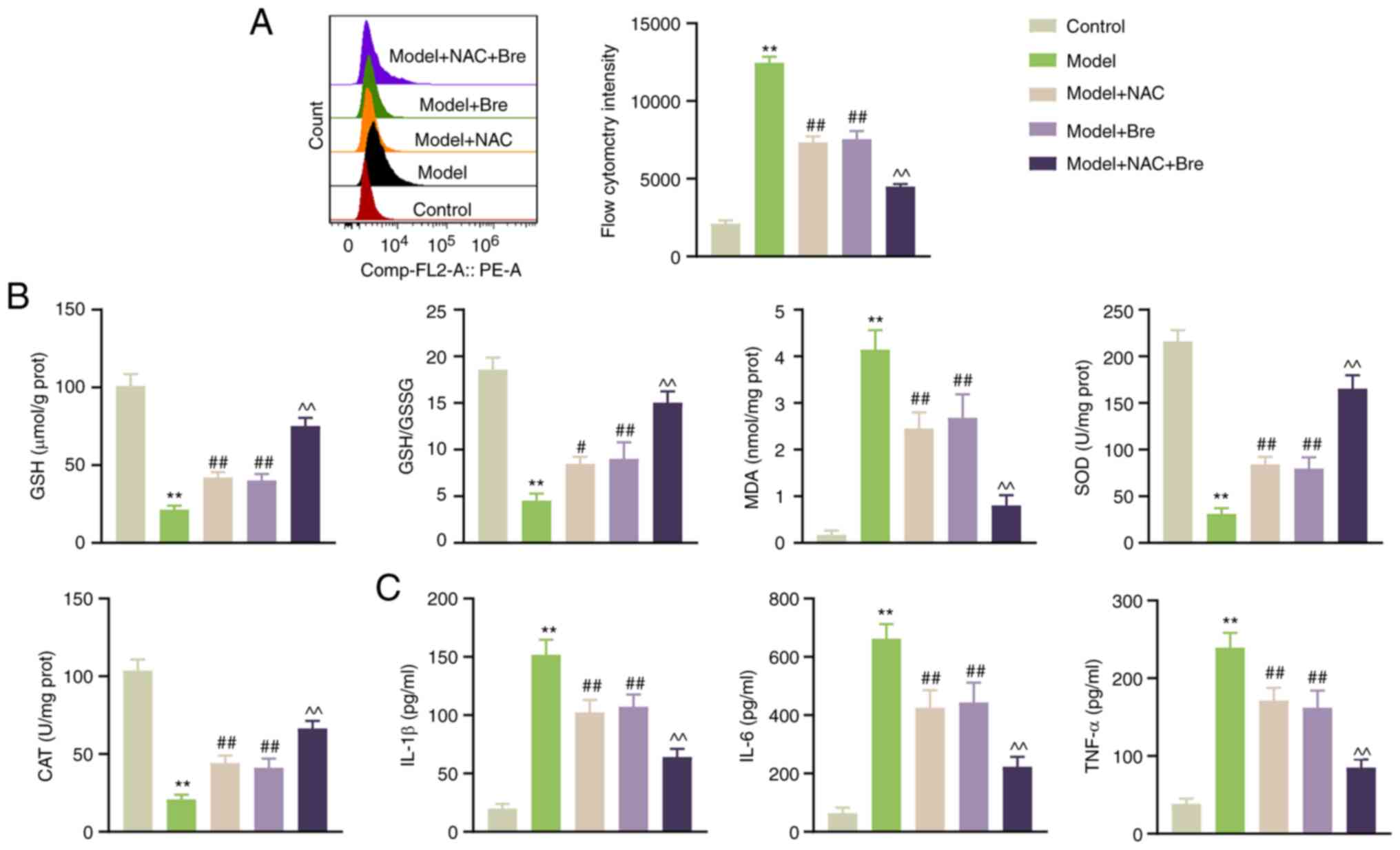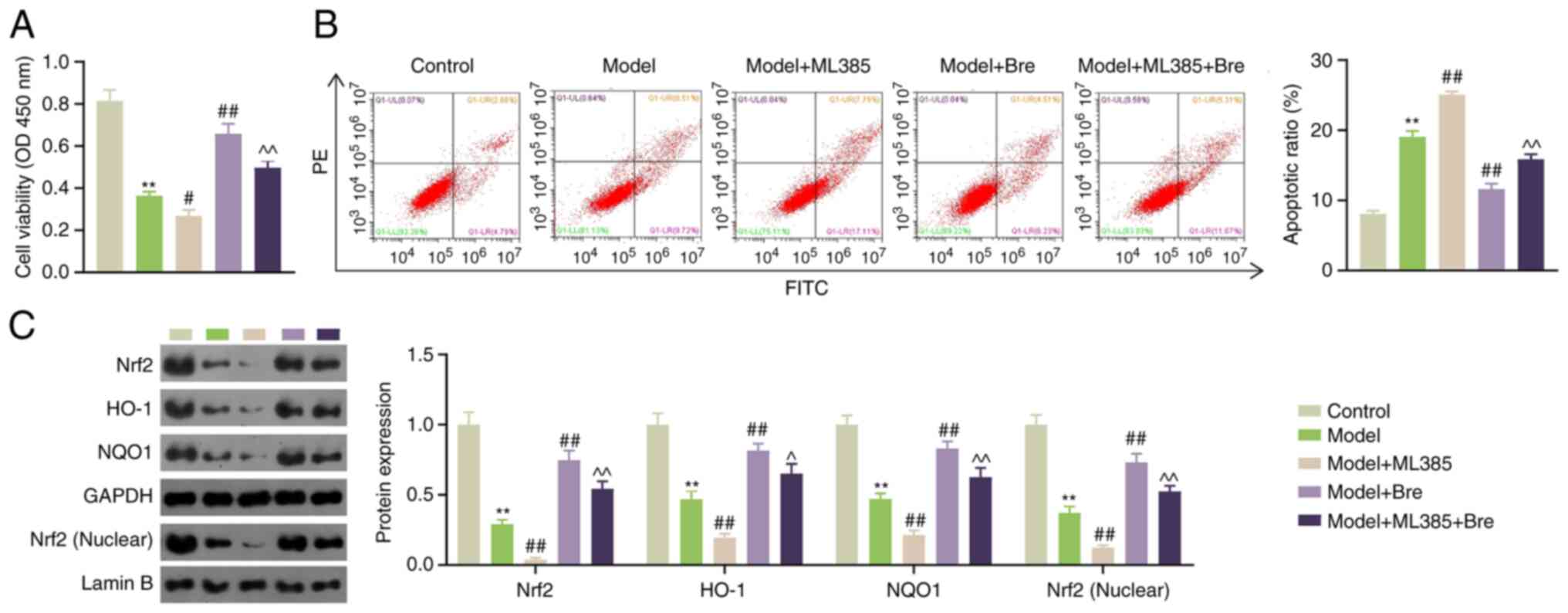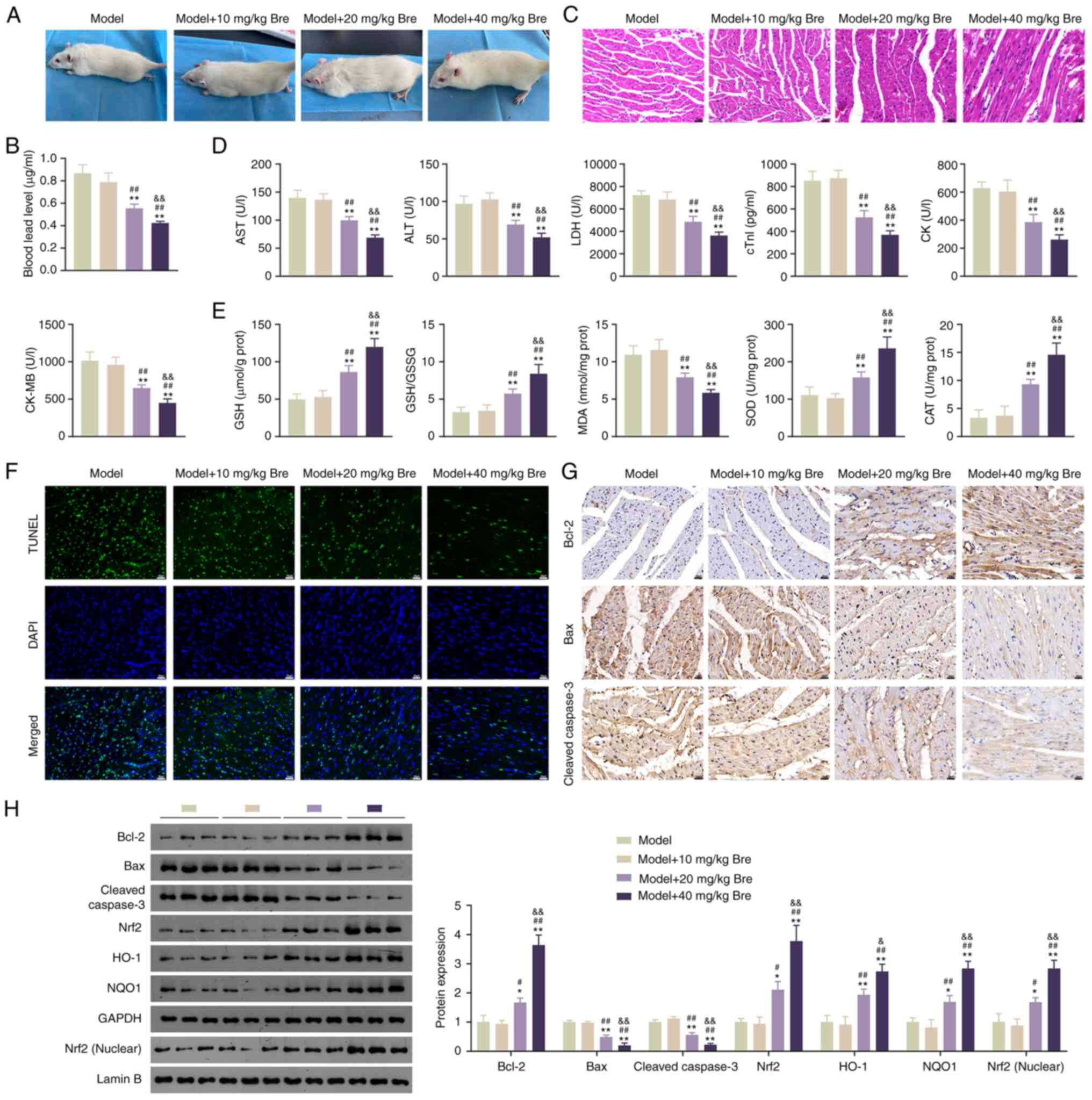|
1
|
Hanna-Attisha M, Lanphear B and Landrigan
P: Lead poisoning in the 21st century: The silent epidemic
continues. Am J Public Health. 108(1430)2018.PubMed/NCBI View Article : Google Scholar
|
|
2
|
Charkiewicz AE and Backstrand JR: Lead
Toxicity and Pollution in Poland. Int J Environ Res Public Health.
17(4385)2020.PubMed/NCBI View Article : Google Scholar
|
|
3
|
Balali-Mood M, Naseri K, Tahergorabi Z,
Khazdair MR and Sadeghi M: Toxic mechanisms of five heavy metals:
Mercury, lead, chromium, cadmium, and arsenic. Front Pharmacol.
12(643972)2021.PubMed/NCBI View Article : Google Scholar
|
|
4
|
Babiker F, Al-Kouh A and Kilarkaje N: Lead
exposure induces oxidative stress, apoptosis, and attenuates
protection of cardiac myocytes against ischemia-reperfusion injury.
Drug Chem Toxicol. 42:147–156. 2019.PubMed/NCBI View Article : Google Scholar
|
|
5
|
Yang D, Li S, Gao L, Lv Z, Bing Q, Lv Q,
Zheng X, Li R and Zhang Z: Dietary grape seed procyanidin extract
protects against lead-induced heart injury in rats involving
endoplasmic reticulum stress inhibition and AKT activation. J Nutr
Biochem. 62:43–49. 2018.PubMed/NCBI View Article : Google Scholar
|
|
6
|
Ferreira G, Santander A, Chavarría L,
Cardozo R, Savio F, Sobrevia L and Nicolson GL: Functional
consequences of lead and mercury exposomes in the heart. Mol
Aspects Med. 87(101048)2022.PubMed/NCBI View Article : Google Scholar
|
|
7
|
Gao J, Chen G, He H, Liu C, Xiong X, Li J
and Wang J: Therapeutic effects of breviscapine in cardiovascular
diseases: A review. Front Pharmacol. 8(289)2017.PubMed/NCBI View Article : Google Scholar
|
|
8
|
Yan L, Huang H, Tang QZ, Zhu LH, Wang L,
Liu C, Bian ZY and Li H: Breviscapine protects against cardiac
hypertrophy through blocking PKC-alpha-dependent signaling. J Cell
Biochem. 109:1158–1171. 2010.PubMed/NCBI View Article : Google Scholar
|
|
9
|
Li MJ, Sun WS, Yuan Y, Zhang YK, Lu Q, Gao
YZ, Ye T and Xing DM: Breviscapine remodels myocardial glucose and
lipid metabolism by regulating serotonin to alleviate
doxorubicin-induced cardiotoxicity. Front Pharmacol.
13(930835)2022.PubMed/NCBI View Article : Google Scholar
|
|
10
|
Chen ZQ, Zhou Y, Chen F, Huang JW, Zheng
J, Li HL, Li T and Li L: Breviscapine pretreatment inhibits
myocardial inflammation and apoptosis in rats after coronary
microembolization by activating the PI3K/Akt/GSK-3β Signaling
pathway. Drug Des Devel Ther. 15:843–855. 2021.PubMed/NCBI View Article : Google Scholar
|
|
11
|
Wang M, Zhang WB, Zhu JH, Fu GS and Zhou
BQ: Breviscapine ameliorates cardiac dysfunction and regulates the
myocardial Ca(2+)-cycling proteins in streptozotocin-induced
diabetic rats. Acta Diabetol. 47 (Suppl 1):S209–S218.
2010.PubMed/NCBI View Article : Google Scholar
|
|
12
|
Zhang M, Yu X, Li D, Ma N, Wei Z, Ci X and
Zhang S: Nrf2 signaling pathway mediates the protective effects of
daphnetin against D-Galactose induced-premature ovarian failure.
Front Pharmacol. 13(810524)2022.PubMed/NCBI View Article : Google Scholar
|
|
13
|
Latella G: Redox imbalance in intestinal
fibrosis: Beware of the TGFβ-1, ROS, and Nrf2 connection. Dig Dis
Sci. 63:312–320. 2018.PubMed/NCBI View Article : Google Scholar
|
|
14
|
Tonelli C, Chio IIC and Tuveson DA:
Transcriptional regulation by Nrf2. Antioxid Redox Signal.
29:1727–1745. 2018.PubMed/NCBI View Article : Google Scholar
|
|
15
|
Chen QM: Nrf2 for cardiac protection:
Pharmacological options against oxidative stress. Trends Pharmacol
Sci. 42:729–744. 2021.PubMed/NCBI View Article : Google Scholar
|
|
16
|
Song Y, Sun H, Gao S, Tang K, Zhao Y, Xie
G and Gao H: Saikosaponin a attenuates lead-induced kidney injury
through activating Nrf2 signaling pathway. Comp Biochem Physiol C
Toxicol Pharmacol. 242(108945)2021.PubMed/NCBI View Article : Google Scholar
|
|
17
|
Chen F, Zhou CC, Yang Y, Liu JW and Yan
CH: GM1 ameliorates lead-induced cognitive deficits and brain
damage through activating the SIRT1/CREB/BDNF pathway in the
developing male rat hippocampus. Biol Trace Elem Res. 190:425–436.
2019.PubMed/NCBI View Article : Google Scholar
|
|
18
|
Ding S, Liu D, Wang L, Wang G and Zhu Y:
Inhibiting MicroRNA-29a protects myocardial ischemia-reperfusion
injury by targeting SIRT1 and suppressing oxidative stress and
NLRP3-Mediated pyroptosis pathway. J Pharmacol Exp Ther.
372:128–135. 2020.PubMed/NCBI View Article : Google Scholar
|
|
19
|
Zawadzki M, Poreba R and Gać P: Mechanisms
and toxic effects of lead on the cardiovascular system. Med Pr.
57:543–549. 2006.PubMed/NCBI(In Polish).
|
|
20
|
Yao L, Chen H, Wu Q and Xie K:
Hydrogen-rich saline alleviates inflammation and apoptosis in
myocardial I/R injury via PINK-mediated autophagy. Int J Mol Med.
44:1048–1062. 2019.PubMed/NCBI View Article : Google Scholar
|
|
21
|
Vukojevic K, Carev D, Sapunar D, Petrovic
D and Saraga-Babic M: Developmental patterns of caspase-3, bax and
bcl-2 proteins expression in the human spinal ganglia. J Mol
Histol. 39:339–349. 2008.PubMed/NCBI View Article : Google Scholar
|
|
22
|
Yuan Y, He P, Tang X, Li J and Mu J:
Effect of breviscapine on proliferation and apoptosis of H9c2
cardiomyocytes and activation of ERK1/2 signaling pathway. J Pract
Med. 36:1611–1615. 2020.(In Chinese).
|
|
23
|
Afsar T, Razak S, Batoo KM and Khan MR:
Acacia hydaspica R: Parker prevents doxorubicin-induced cardiac
injury by attenuation of oxidative stress and structural
Cardiomyocyte alterations in rats. BMC Complement Altern Med.
17(554)2017.PubMed/NCBI View Article : Google Scholar
|
|
24
|
Wang J, Ji SY, Liu SZ, Jing R and Lou WJ:
Cardioprotective effect of breviscapine: Inhibition of apoptosis in
H9c2 cardiomyocytes via the PI3K/Akt/eNOS pathway following
simulated ischemia/reperfusion injury. Pharmazie. 70:593–597.
2015.PubMed/NCBI
|
|
25
|
Hayden J and Bostick B: Western diet
induced obesity increases oxidative stress in the heart by
impairing the Nrf2 antioxidant response pathway. J Am Coll Cardiol.
73 (9 Suppl)(S896)2019.
|
|
26
|
Prasai PK, Shrestha B, Orr AW and Pattillo
CB: Decreases in GSH:GSSG activate vascular endothelial growth
factor receptor 2 (VEGFR2) in human aortic endothelial cells. Redox
Biol. 19:22–27. 2018.PubMed/NCBI View Article : Google Scholar
|
|
27
|
Quintana-Cabrera R, Fernandez-Fernandez S,
Bobo-Jimenez V, Escobar J, Sastre J, Almeida A and Bolaños JP:
γ-Glutamylcysteine detoxifies reactive oxygen species by acting as
glutathione peroxidase-1 cofactor. Nat Commun.
3(718)2012.PubMed/NCBI View Article : Google Scholar
|
|
28
|
Giustarini D, Tsikas D, Colombo G, Milzani
A, Dalle-Donne I, Fanti P and Rossi R: Pitfalls in the analysis of
the physiological antioxidant glutathione (GSH) and its disulfide
(GSSG) in biological samples: An elephant in the room. J Chromatogr
B Analyt Technol Biomed Life Sci. 1019:21–28. 2016.PubMed/NCBI View Article : Google Scholar
|
|
29
|
Jiang X, Xing X, Zhang Y, Zhang C, Wu Y,
Chen Y, Meng R, Jia H, Cheng Y, Zhang Y and Su J: Lead exposure
activates the Nrf2/Keap1 pathway, aggravates oxidative stress, and
induces reproductive damage in female mice. Ecotoxicol Environ Saf.
207(111231)2021.PubMed/NCBI View Article : Google Scholar
|
|
30
|
He H, Wang L, Qiao Y, Zhou Q, Li H, Chen
S, Yin D, Huang Q and He M: Doxorubicin induces endotheliotoxicity
and mitochondrial dysfunction via ROS/eNOS/NO pathway. Front
Pharmacol. 10(1531)2020.PubMed/NCBI View Article : Google Scholar
|
|
31
|
Qiao Y, Hu T, Yang B, Li H, Chen T, Yin D,
He H and He M: Capsaicin alleviates the deteriorative mitochondrial
function by upregulating 14-3-3η in anoxic or anoxic/reoxygenated
cardiomyocytes. Oxid Med Cell Longev. 2020(1750289)2020.PubMed/NCBI View Article : Google Scholar
|
|
32
|
Guo J, Pu Y, Zhong L, Wang K, Duan X and
Chen D: Lead impaired immune function and tissue integrity in
yellow catfish (Peltobargus fulvidraco) by mediating oxidative
stress, inflammatory response and apoptosis. Ecotoxicol Environ
Saf. 226(112857)2021.PubMed/NCBI View Article : Google Scholar
|
|
33
|
Yu L, Li HX, Guo JY, Huang YQ, Wang H,
Talukder M and Li JL: Di (2-ethyl hexyl) phthalate (DEHP)-induced
spleen toxicity in quail (Coturnix japonica) via disturbing
Nrf2-mediated defense response. Environ Pollut. 251:984–989.
2019.PubMed/NCBI View Article : Google Scholar
|
|
34
|
Yang D, Lv Z, Zhang H, Liu B, Jiang H, Tan
X, Lu J, Baiyun R and Zhang Z: Activation of the Nrf2 Signaling
pathway involving KLF9 plays a critical role in allicin resisting
against arsenic trioxide-induced hepatotoxicity in rats. Biol Trace
Elem Res. 176:192–200. 2017.PubMed/NCBI View Article : Google Scholar
|
|
35
|
Ursini F, Maiorino M and Forman HJ: Redox
homeostasis: The Golden Mean of healthy living. Redox Biol.
8:205–215. 2016.PubMed/NCBI View Article : Google Scholar
|
|
36
|
Li J, Zheng X, Ma X, Xu X, Du Y, Lv Q, Li
X, Wu Y, Sun H, Yu L and Zhang Z: Melatonin protects against
chromium(VI)-induced cardiac injury via activating the AMPK/Nrf2
pathway. J Inorg Biochem. 197(110698)2019.PubMed/NCBI View Article : Google Scholar
|
|
37
|
Liu B, Jiang H, Lu J, Baiyun R, Li S, Lv
Y, Li D, Wu H and Zhang Z: Grape seed procyanidin extract
ameliorates lead-induced liver injury via miRNA153 and
AKT/GSK-3β/Fyn-mediated Nrf2 activation. J Nutr Biochem.
52:115–123. 2018.PubMed/NCBI View Article : Google Scholar
|


















